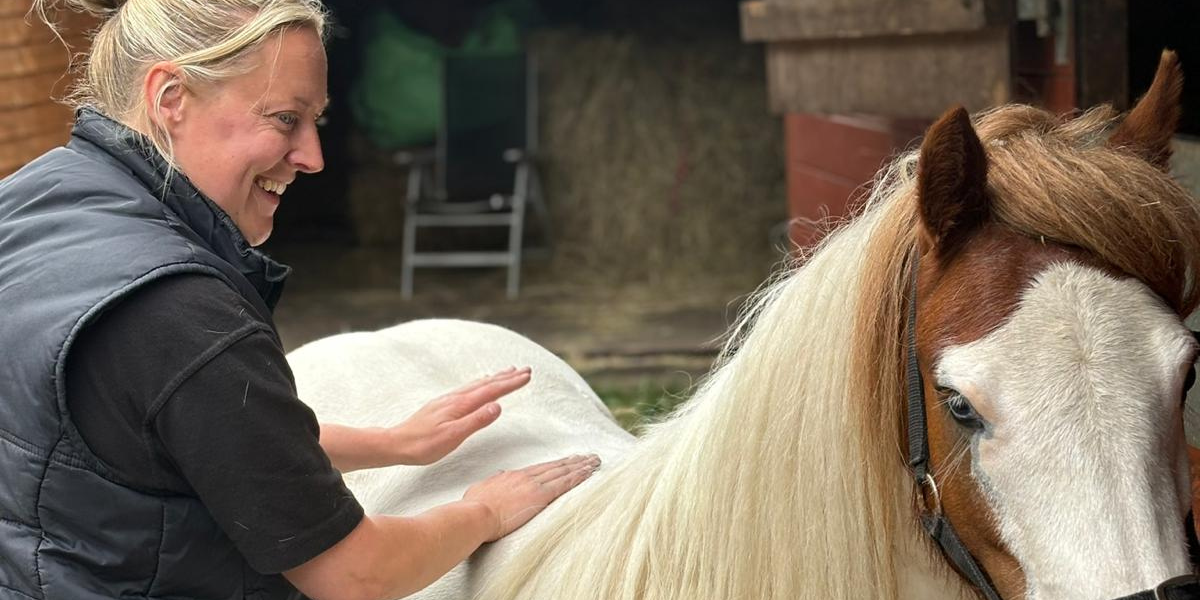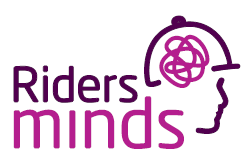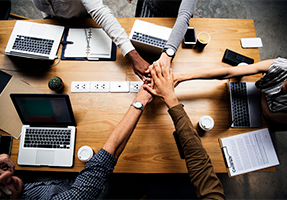
Shelley Mannion, Certified Equine Sports Massage and Rehabilitation Therapist shares her story about coping with working alone and Imposter Syndrome.
Massage is a hands-on therapy that involves assessment and manipulation of the body using a range of soft tissue techniques alongside stretching, joint mobilisations and muscle activations. During each session your therapist will work with your horse to engage their mind and body to induce relaxation and get the most out of their session (Equine Sports Massage Association, n.d.).
The successful provision of equine massage therapy requires the knowledge, skills and competency of a qualified practitioner who primarily aims to maintain and improve the functionality of a horse’s musculoskeletal system. Since qualifying as an equine sports and rehabilitation massage therapist, it has become more evident how this modality has scope to connect with horses and their owners on a much deeper level. Furthermore, many therapists strengthen service provisions, gaining additional knowledge and skills to delve deeper in to a holistic treatment pathway. Some of the work being undertaken by fellow therapists is phenomenal and their expertise and knowledge is commendable.
A year into one of the most rewarding challenges I’ve given myself over the years, I am still very much exploring myself to find my own identity as an equine therapist whilst building confidence and trust out there in the equine community. However, there is a common theme I’ve identified; the challenges associated with lone working, isolation, managing a business, family life and imposter syndrome as an equine professional.

Equine therapists surround themselves with fellow professionals, amazing horses and their owners throughout their working days in the most rewarding job that returns many positive and beneficial rewards. Yet, there are many discussions I have seen on social media relating to the greater challenges associated with the role. These have included maintaining professional status, the unpredictability of the workload, isolation and aiming for that 100% positive feedback from our clients, their horses and fellow equine professionals.
The pressure to deliver high standard equine services to the horses in our care and continue to receive positive feedback from clients, their horses and fellow professionals can bring additional challenges across the profession. Autonomous working can also increase pressures associated with safety and isolation.

Imposter syndrome
So how does such a rewarding role impact on mental health and further exacerbate the dreaded imposter syndrome? Imposter syndrome is defined as “self-doubt of intellect, skills, or accomplishments among high-achieving individuals” and is associated with its negative impact on mental health (Huecker et al., 2023). The focus of maintaining professional status and that all important positive feedback, interlinks with feelings of self-doubt in an industry with many high achieving individuals. Furthermore, this engages professionals to doubt their intellect, skills and accomplishments often comparing themselves to their peers. I have discussed with both newly qualified equine therapists and those who have been in the industry a number of years, the frustrations associated with battling imposter syndrome.
The concept of imposter syndrome can also be interlinked with lone working and isolated roles. Although many equine therapists spend their working days with wonderful horses and their clients, many of us are facilitating independently owned small businesses which can further escalate the feeling of isolation, loneliness and imposter syndrome.
Carter (n.d) (Grooms List), evaluated mental health in the equine industry, concluding that collaboratively working together and supporting one another can indeed further impact positively on mental health across the profession.
In 2017, The British Grooms Association launched a project and survey to explore the mental health challenges of those working in the equine industry.
An incredible “83% of grooms who responded are suffering from stress and/or mental wellbeing problems” (British Grooms Association, 2018). This response raises the question of what % of other equine professionals are met with similar challenges associated with stress, mental health and well-being.
Self doubt
I’ve spent many an hour in my own mind post therapy session, questioning if I’ve made the right therapeutic decisions. Did I choose the correct massage technique? Did I manage the horse’s behaviour appropriately? Did I complete the static and dynamic assessment in adequate detail? Did I uncover any underlying health condition? Did I upset the client with some of my honest and transparent feedback? Will they tell their friends they didn’t like my approach to treatment? Have I undertaken enough education to be the equine therapist I am qualified to be? Most importantly, did the horse benefit from the therapy session, what was the horse’s opinion of me!
The self-doubt itself can be exhausting. As I write these questions, I consider how know many other equine therapists at some point in their career will have thought the same and even those with extensive experience, will on occasion ask themselves similar questions. The answer to all of these questions, is that we made a professional judgement at the time of treatment in the interest of the horse’s well-being; drawing in on the knowledge and skills learnt during our initial education and training and continued professional development.

Therefore, concluding that there is no requirement to challenge ourselves or our practice as we have simply aimed to provide the best service we can to all horses in our care; with the knowledge and skills we have as individual practitioners. The impact from self-doubt and reflection has scope to impact negatively on mental health and it is important to collaboratively work together to support one another through this challenge.
Improving the mental health and well-being of equine therapists who face the challenges of isolation, self-doubt and battling imposter syndrome is something as a profession we can collectively achieve together.
Clients and their horses play an important role in this also, with a shared passion to support horses to be at optimum health whilst also championing each other to feel the same.
I’ve been extremely lucky to join an incredible network of equine therapists and without their support, my confidence wouldn’t be growing every day. I advocate others to do the same, reach out to your fellow equine therapists, join the networking platforms and don’t be afraid to ask for support and guidance from across the profession and utilise supporting organisations including Riders Minds. Joining together to achieve our collective aim across the profession can only bring even more joy and happiness to working life, eliminate the isolation and imposter syndrome to further strengthen the end goal, to be at the forefront of maintaining the health and well-being of horses together.
Shelley Mannion (Certified Equine Sports Massage & Rehabilitation Therapist)

If you need support
Call our helpline free on 0800 088 2073
Or if you prefer to message then text us on 07480 488 103
To access the live chat click the purple chat button and you will be connected to one of our trained counsellors.
References
British Grooms Association. (2018) Grooms Minds Plan. [Online] Available from: https://britishgrooms.org.uk/news/198/grooms-minds-plan. [Accessed 20 June 2024].
Carter, C. (n.d) Mental Health in the Equine Industry. [Online] Available from: https://thegroomslist.co.uk/mental-health-in-the-equine-industry/. [Accessed 20 June 2024].
Equine Sports Massage Association. (n.d) What is equine sports massage. [Online] Available from: https://equinemassageassociation.co.uk/what-is-equine-sports-massage/. [Accessed 20 June 2024].
Huecker, M., Shreffler,J., McKeny, P., Davis, D. (2024) Imposter Phenomenon. [Online] Available from: https://pubmed.ncbi.nlm.nih.gov/36251839/. [Accessed 20 June 2024].





Thank you 😊 💓